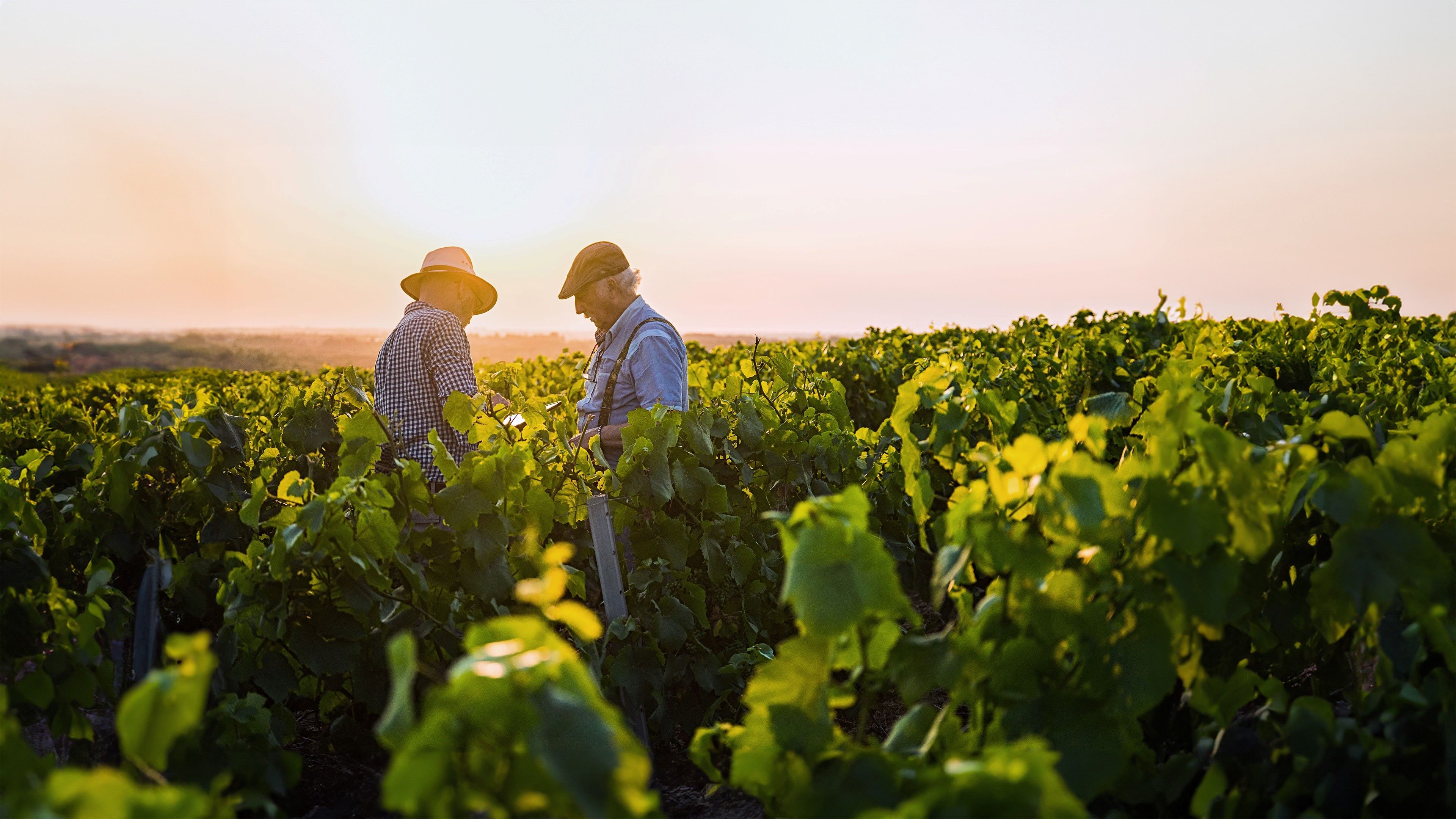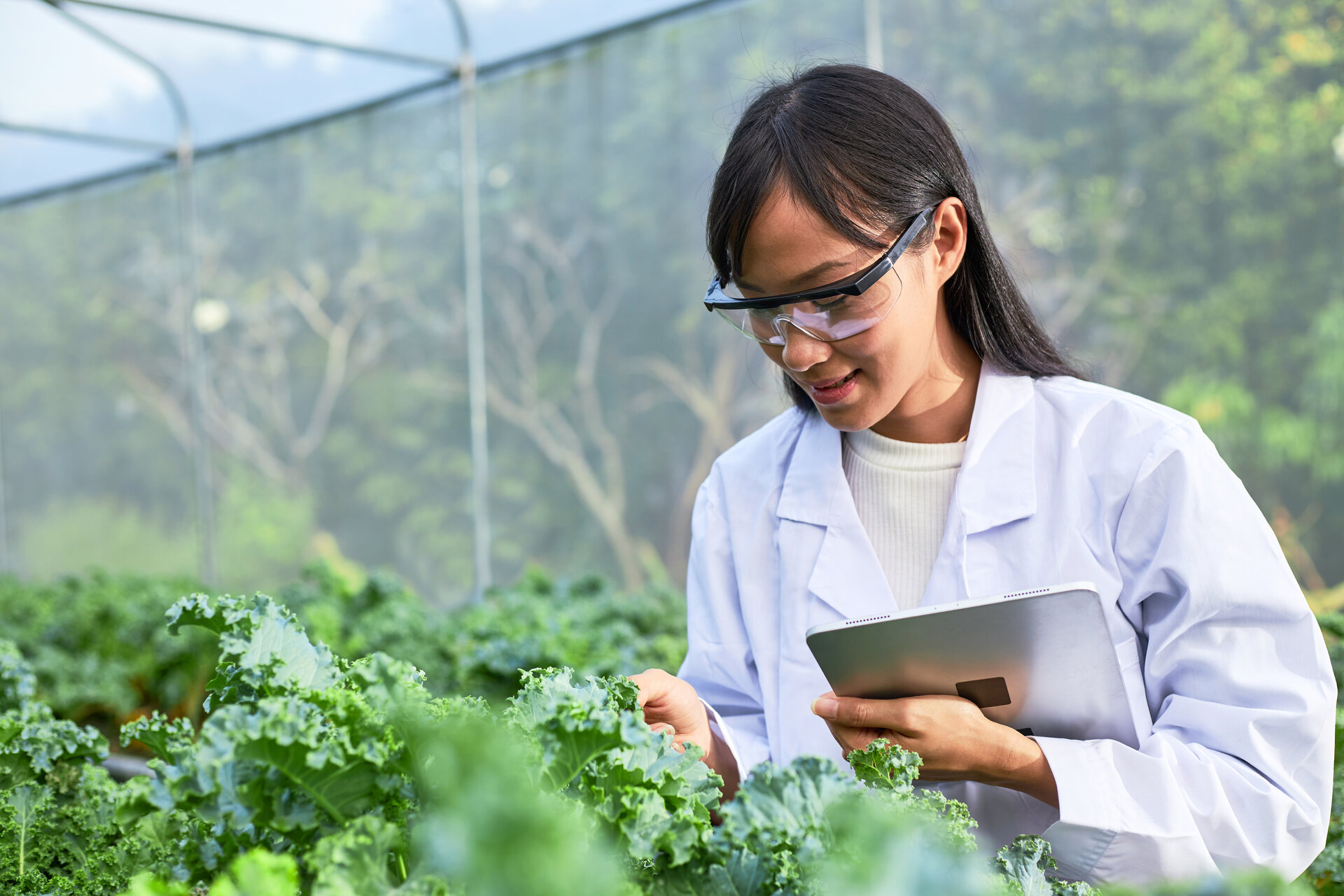
Impact areas and claims
Food safety
Food safety begins on the farm, and protecting the right of current and future generations to safe food has been a guiding principle of our work for over 20 years. Our standards aim to support food safety as a core part of responsible production processes, addressing aspects such as hazard and risk management systems, product handling and worker training, hygiene and biosecurity, verification and testing, and more.
Safe food begins with safe practices on the farm
Why do GLOBALG.A.P. standards address food safety?
According to the World Health Organization (WHO), approximately 600 million people fall ill each year due to contaminated food. In the wider context of climate change – and with the global population expected to reach almost 10 billion by 2050 (FAO) – the required increase in food production must be achieved in a safe and responsible way to protect the health of communities around the world. Farm-level standards can support resource management and risk mitigation in production processes, as well as the long-term viability of farming operations through continuous improvement.

How do GLOBALG.A.P. standards address food safety?
Our standards require the implementation of procedures that are designed to manage and minimize food safety risks at farm level. They have consistently achieved recognition from the Global Food Safety Initiative (GFSI).
Core food safety aspects in GLOBALG.A.P. standards include:
Mitigation of risks introduced by people, premises, production activities, and products/materials
Implementation of management systems and a continuous improvement plan
Utilization of a risk-based approach
Verification and testing
What we claim: GLOBALG.A.P. standards provide a tool to producers to support the implementation of procedures for the identification and mitigation of farm-level food safety risks that are potentially introduced during the production and handling processes.
How we address it: Our standards include criteria on the identification of risks and controllable elements as part of a hazard and risk management system (based on the Codex Alimentarius designed Hazard Analysis and Critical Control Point (HACCP) system).
Regarding people, this includes requirements on worker competency (e.g., technical advisors, subcontractors, and farm employees) relating to the production and handling of products, training on procedures for biosecurity and chemical handling, and the monitoring of personal health, hygiene, and protective clothing.
Regarding premises, this includes requirements on the implementation of a food defense system (e.g., secure storage and transport), the maintenance of site structures and the local environment to prevent contamination (e.g., foreign materials, fields and greenhouses), the provision of clean sanitary facilities for employees (e.g., toilets and handwashing), the utilization of suitable water sources (e.g., those in contact with the product), and the management of waste and pests.
Regarding production activities, this includes requirements on the control of equipment (e.g., measuring and monitoring devices), the evaluation and approval of suppliers and their materials and services performance (e.g., manure and fertilizers), the observation of registered preharvest intervals (e.g., for plant protection products), the appropriate storage of harvested/packed products, the implementation of labeling processes as part of a traceability system, and the implementation of a risk-based biosecurity plan.
Regarding products, materials, and inputs, this includes requirements on the segregation of non-conforming products (e.g., the appropriate redirection to a suitable end use or safe disposal), the maintenance of storage areas (e.g., for water and chemicals), and the use of fit-for-purpose equipment in contact with the product (e.g., tools and containers).
Why we address it: Safe food is vital for the health and well-being of consumers. Primary production areas are not a controlled environment, and there are activities and influences that could potentially affect food safety. Risk management systems are therefore designed to identify and support the mitigation of points in the production and handling processes where hazards may occur.
Standards which include criteria on the mitigation of risks introduced by people, premises, production activities, and products/materials:
Integrated Farm Assurance (IFA) for fruit and vegetables
Integrated Farm Assurance (IFA) for aquaculture
Integrated Farm Assurance (IFA) for hops
Integrated Farm Assurance (IFA) for combinable crops
Integrated Farm Assurance (IFA) for plant propagation material
Integrated Farm Assurance (IFA) for tea
Produce Handling Assurance (PHA)
Harmonized Produce Safety Standard (HPSS)
Crops for Processing (CfP)
Compound Feed Manufacturing (CFM)
| Ref | FV-Smart 21.01 |
| Principle | A documented risk assessment is completed for all registered sites. |
| Criteria | The risk assessment shall be: Available for all production sites, including structures Reviewed at least annually or when changes occur (new risks emerge or new sites or crops enter production) It shall consider: Biological, physical, and chemical hazards (including allergens) Risk of microbial cross contamination originating from neighboring or adjacent sites Site history (minimum of one year, with five years recommended) Impact of proposed activities of adjacent crops |
| Compliance level | Major Must |
Source: Integrated Farm Assurance (IFA) v6 Smart for fruit and vegetables
| Ref | AQ 17.01 |
| Principle | Specifications for materials and services that are relevant to food safety are in place and readily available. |
| Criteria | A procedure shall be implemented and maintained for the control of suppliers of inputs and services that may introduce a food safety risk. The procedure shall include: Evaluation, approval, and continued monitoring of suppliers Procurement in emergency situations to ensure materials and services still conform to specifications Availability of records of evaluations, investigations, and follow-up actions Specifications supporting the implementation of the standard and customer compliance shall be available. Specifications shall be reviewed annually or when changes occur, whichever is sooner. These changes may include the following, where relevant: Supplier specifications for packaging (where applicable) Allowable and acceptable licenses or qualifications for service providers (pest control contractors, laboratory services, etc.) Descriptions of customer requirements Defined specifications for raw materials Descriptions of how alternate suppliers will be evaluated in the event of emergency or supply chain disruptions shall also be available. |
| Compliance level | Major Must |
Source: Integrated Farm Assurance (IFA) v6 Smart/GFS for aquaculture
What we claim: GLOBALG.A.P. standards seek to guide producers on the implementation and maintenance of management system elements which are also designed to foster a culture of continuous improvement at farm level.
How we address it: Our standards include criteria on the adoption of document and record control procedures, the implementation of an annual self-assessment (internal audit) including corrective actions to address non-conformances, the implementation of a training program for workers with assigned tasks (e.g., chemical handling, product handling), the implementation of procedures for the management of complaints and serious incidents, and the creation of a food safety policy declaration that supports communication, resource management, objective tracking, and more.
Why we address it: Management systems are essential to support the identification and control of all relevant food safety risks at the relevant steps throughout the production process. Contact and communication, e.g., with suppliers of materials and services required for the production, assist in clarifying supplier requirements and product specifications. An effectively implemented food safety management system can support the identification and mitigation of potential risks. The implementation of a continuous improvement plan encourages measurable target setting that helps producers to improve the efficiency of their food safety and other operations.
Standards which include criteria on the implementation of management systems and *a continuous improvement plan:
Integrated Farm Assurance (IFA) for fruit and vegetables*
Integrated Farm Assurance (IFA) for aquaculture*
Integrated Farm Assurance (IFA) for hops*
Integrated Farm Assurance (IFA) for combinable crops
Integrated Farm Assurance (IFA) for tea
Produce Handling Assurance (PHA)
Harmonized Produce Safety Standard (HPSS)
Crops for Processing (CfP)
| Ref | FV-Smart 14.01 |
| Principle | The producer has completed and signed the food safety policy declaration. |
| Criteria | The producer’s food safety policy declaration shall: Support the existence of a food safety culture, consisting of communication, training, feedback from workers, and measurable food safety objectives Be annually completed and signed by the producer/manager responsible for food safety Indicate people whose activities impact food safety Serve as documented evidence of commitment to continuous improvement, food safety culture, provision of resources, and adherence to relevant prevailing regulations Serve as documented evidence of review by management of all elements of the food safety system, on an annual basis or whenever changes occur that impact food safety Substantiate the self-assessment checklist (for Option 1 individual producers) Be completed either by central management or on quality management system (QMS) level on behalf of Option 2 producer group members and Option 1 multisite producers with QMS |
| Compliance level | Major Must |
Source: Integrated Farm Assurance (IFA) v6 Smart for fruit and vegetables
See also: Integrated Farm Assurance (IFA) v6 Smart/GFS for aquaculture (section AQ 15.01)
What we claim: GLOBALG.A.P. standards aim to support a risk-based product safety approach that grounds the development and implementation of operational plans and systems on respective farm-level risk assessments.
How we address it: Our standards include criteria on a risk assessment designed to identify potential threats to product safety as a prerequisite starting point for the development of the required food defense and food fraud plans. This also covers aspects such as hygiene procedures (at all stages of the production process), site management (e.g., land used for production, site history, impact of proposed activities), allergen management (e.g., potential allergen-containing materials that might be produced, handled, or stored on site), and water management (e.g., identification of water sources, associated risks to product, and thresholds for water quality).
Why we address it: Risk assessments can help producers to improve awareness and uncover risks that may not have been previously addressed. They are especially imperative to identify and mitigate potential hazards that might be unique to a specific production process or site. Accurate risk assessments support the development of accurate management plans and systems that are fit for purpose and less prescriptive.
Standards which include criteria on utilizing a risk-based approach:
Integrated Farm Assurance (IFA) for fruit and vegetables
Integrated Farm Assurance (IFA) for aquaculture
Integrated Farm Assurance (IFA) for hops
Integrated Farm Assurance (IFA) for combinable crops
Integrated Farm Assurance (IFA) for tea
Produce Handling Assurance (PHA)
Harmonized Produce Safety Standard (HPSS)
| Ref | FV-Smart 30.01.01 |
| Principle | There is a risk assessment to assess food safety risks for pre- and postharvest water used. |
| Criteria | There shall be a documented risk assessment for water used for indoor and outdoor production and postharvest activities. The assessment shall cover, at minimum: Identification of water sources by means of maps, photographs, drawings (hand drawings are acceptable), or other depictions to identify the location of water source(s), permanent fixtures, and the flow of the water system (including holding systems, reservoirs, or any water captured for reuse), the depiction shall be linked with site maps and an on-farm reference system Historical analysis results, where applicable The timing of water use (crop growth stage or postharvest) The risk of physical, chemical, and microbial contamination Methods to address risk associated with water delivery mechanisms, mitigating the risk of cross contamination The contact of water with the crop The characteristics of the crop and the growth stage or handling The quality of the water used for fertilizer, plant protection product, or postharvest applications Measures taken to mitigate contamination risk, where appropriate (e.g., preventing human and livestock intrusion with fencing) Acceptable thresholds for water quality Impact on food safety and fit-for-purpose Control of water not intended for use in food production (stored water for grounds maintenance, etc.) A minimum requirement of one analysis per season or certification cycle for water used in postharvest activities that comes in contact with the product, the sample to be taken as near the point of application as possible (minimum of one analysis required even when using municipal water sources). The risk assessment shall be reviewed annually and whenever risks change due to operational changes. |
| Compliance level | Major Must |
Source: Integrated Farm Assurance (IFA) v6 Smart for fruit and vegetables
| Ref | AQ 22.01.03 |
| Principle | If the hatchery uses either raw and unpasteurized or live feed, this is based on a food safety and biosecurity risk assessment. |
| Criteria | Specific to hatcheries: A risk assessment shall be available to show that either raw and unpasteurized or live feed (artemia, microalgae, rotifers, etc.) will not affect the biosecurity of the farmed aquatic species and will not have a negative impact on food safety and animal welfare. Evidence of routine surveillance disease monitoring for pathogens shall be in place and make up part of the risk assessment. If the use of compound feed is possible, it shall be the preferred solution. |
| Compliance level | Major Must |
Source: Integrated Farm Assurance (IFA) v6 Smart/GFS for aquaculture
What we claim: GLOBALG.A.P. standards are designed to incorporate the verification of crucial food safety parameters and provide guidance on the reliability and effectiveness of relevant testing activities.
How we address it: Our standards include criteria on the assessment on subcontractors (e.g., outsourced activities and processes) to ensure compliance with the relevant standard requirements, the annual verification of the traceability system and recall and withdrawal system, the calibration of farm equipment (e.g., plant protection product application devices) to verify accurate operation, the analysis of water sources (e.g., for water quality parameters) in line with the water risk assessment, the analysis of product for maximum residue levels (MRLs), and the implementation of a microbial environmental monitoring program to verify the effectiveness of cleaning procedures and identify sources of potential contamination in the site environment (e.g., in water, air, surfaces). For some standards, testing/analysis via laboratory services is required to confirm product/material safety. Based on the risk and specific testing required, we provide guidance on what is to be considered (e.g., reference to industry requirements, participation in proficiency testing, recognition of standards for laboratory practices).
Why we address it: Verification programs can help to confirm the effectiveness of the management plans and controls that are implemented to mitigate potential risks. These programs form part of the Codex HACCP approach that supports our standards. Testing procedures, such as those for MRLs, monitor that the use of plant protection products does not exceed recognized safe levels and therefore supports the safeguarding of consumer health.
Standards which include criteria on verification and testing:
Integrated Farm Assurance (IFA) for fruit and vegetables
Integrated Farm Assurance (IFA) for aquaculture
Integrated Farm Assurance (IFA) for hops
Integrated Farm Assurance (IFA) for combinable crops
Integrated Farm Assurance (IFA) for tea
Produce Handling Assurance (PHA)
Harmonized Produce Safety Standard (HPSS)
| Ref | FV-Smart 32.07.02 |
| Principle | A risk assessment for all registered products has been completed and the maximum residue level (MRL) requirements of the applicable market(s) are met. |
| Criteria | The risk assessment shall cover all registered crops and the potential risk of MRL exceedance based on plant protection product (PPP) usage. Residues of agricultural chemicals shall not exceed levels established by applicable and prevailing legislation (in both countries of production and intended sale), or by the Codex Alimentarius Commission. Risk assessment may conclude that analyses are not required when all of the following conditions are met: No use of PPPs during the production season or during postharvest handling Evidence of residue testing by the customer (processor or other) A risk assessment validated by an independent third party (e.g., certification body (CB) auditor) or the customer Where the risk assessment concludes an analysis is required, the number, type, location, and frequency of sampling shall be recorded. Complying with MRL thresholds in the country of production is required, regardless of whether the product is exported to other countries. If MRLs of the market of intended export are stricter than those of the country of production, documentation exists that these MRLs have been addressed. Documentation shall support export decisions based upon PPP use and MRL analysis results to maintain compliance with country-of-destination regulations. Where brokers are responsible for all shipments and the country-of-destination is outside of the producer’s control, compliance with the MRLs in the country of production shall be verified. The producer may delegate the risk assessment and sampling to a third party managed PPP residue monitoring system (RMS) that is assessed by a GLOBALG.A.P. approved CB. |
| Compliance level | Major Must |
Source: Integrated Farm Assurance (IFA) v6 Smart for fruit and vegetables
| Ref | AQ 20.02.18 |
| Principle | The farm/hatchery/ transport and holding facilities have a routine water quality monitoring and control program based on a risk assessment and taking into account potential contamination, farmed aquatic species health and welfare, and the production system. |
| Criteria | The farm shall have in place a monitoring and control program based on a risk assessment for water quality to ensure that the health and welfare of the farmed aquatic species is not compromised. The risk assessment (refer to AQ 20.02.16) shall include relevant water quality parameters, fluctuations, and sampling points (at farm or production unit level), such as temperature, dissolved oxygen, carbon dioxide, dissolved nitrogen (over-saturation), pH, ammonia, nitrate, nitrite, suspended solids, and microbiological parameters (e.g., fecal indicators), among others identified in the risk assessment as necessary. Records for each site shall be in place. Frequency shall be related to the aquaculture system used and shall be established by the risk assessment. Laboratory testing shall occur in a manner consistent with industry requirements and prevailing regulations. No “N/A.” |
| Compliance level | Major Must |
Source: Integrated Farm Assurance (IFA) v6 Smart/GFS for aquaculture
Access GLOBALG.A.P. standard documents
GLOBALG.A.P. standard documents are publicly available, free of charge, and translated into multiple languages. They are developed through a transparent and comprehensive standard setting process that involves stakeholders from across the supply chain and includes scientific and technical expertise, field trials, and public consultation.

Corporate news and events have moved!
All the latest updates can now be found on the Agraya website – connecting people, ideas, and solutions across the global farming network.